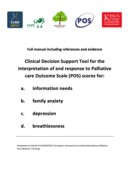|
|
|
POS resources
We have developed a range of resources for POS use.
The POS family of measures are copyright and free to use. We ask you to register to download files or see links on this page. Once you have registered you will be able to download the materials and we can contact you with any updates or further information.
|

|
How should we manage information needs, family anxiety, depression and breathlessness for those affected by advanced disease: development of a clinical decision support tool using a Delphi design.
Clinicians request guidance to aid the routine use and interpretation of Patient Reported Outcome Measures (PROMs), but tools are lacking. We aimed to develop a Clinical Decision Support Tool (CDST) focussed on: information needs, family anxiety, depression and breathlessness (measured using the Palliative care Outcome Scale (POS)) and related PROM implementation guidance.
This CDST provides a straightforward guide to help support clinical care and improve evidence-based outcomes for patients with progressive illness and their families, addressing 4 areas of clinical uncertainty. Recommendations should be used flexibly, alongside skilled individual clinical assessment and knowledge, taking into account patients' and families' individual preferences, circumstances and resources. The CDST is provided with accompanying implementation guidance to facilitate PROM use and is ready for further development and evaluation.
Reference: Van Vliet LM, Harding R, Bausewein C, Payne S, Higginson IJ, EUROIMPACT. How should we manage information needs, family anxiety, depression and breathlessness for those affected by advanced disease: development of a Clinical Decision Support Tool using a Delphi design. BMC Medicine 2015, 13:263 doi:10.1186/s12916-015-0449-6
Download 3 booklets/reports based on this research:
Guidance on the implementation of Patient Reported Outcome Measures (PROMs) in clinical palliative care.
Clinical Decision Support Tool for the interpretation of and response to Palliative care Outcome Scale (POS) scores for: a) information needs; b) family anxiety; c) depression; d) breathlessness.
Full manual including references and evidence
|
|

|
Outcome measurement in palliative care: The essentials.
More and more people are living with a chronic disease near the end of their life, in Europe as well as the rest of the world.
Palliative care needs are therefore increasing, and they are also becoming more complex because of the range of illnesses patients are suffering from.
This guidance gives palliative care professionals information about what outcome measurement is and how it can be used to improve care plus guidance on choosing and using outcome measures.
This booklet will be useful for anyone working with those requiring palliative care, including nurses, doctors, psychologists, social workers, those providing spiritual care and therapists.
Reference: Bausewein C, Daveson BA, Benalia H, Simon ST, Higginson IJ on behalf of PRISMA. Outcome measurement in palliative care. The essentials. London, King's College London, 2011. 39 p.
Download:
|
|

|
A user's guide to the Palliative care Outcome Scale.
This booklet provides a practical guide to using POS. Part I discusses key issues in measuring outcomes in health and palliative care. Part II covers the background to the tool. Part III explores issues around implementing the POS. Part IV considers data analysis and interpretation. Finally, Part V illustrates POS in Practice.
Download :POS user manual (Scanned PDF, 8MB)
|
|

|
Manual for crosscultural adaptation and psychometric validation of the POS (no login required).
Since the first publication of Palliative care Outcome Scale (POS) in 1999, interest in the adaptation and validation of POS has grown. This growth and interest has prompted the POS Development Team to produce this guidance for the cross-cultural adaptation and validation of the POS and all of its derivatives for use with adults. This guidance will help ensure the construction of excellent quality instruments, derived from universally accepted translation and validation standards regarding scale development.
Reference: Bárbara Antunes, Alice Firth, Jana Witt, Barbara Daveson, Christina Ramsenthaler, Hamid Benalia, Pedro Lopes Ferreira, Claudia Bausewein, Irene J. Higginson and Fliss EM Murtagh; The Palliative care Outcome Scale (POS) Family of Measures - Manual for Translation, Cross-Cultural Adaptation and Psychometric Testing, London, July 2015.
|
|








